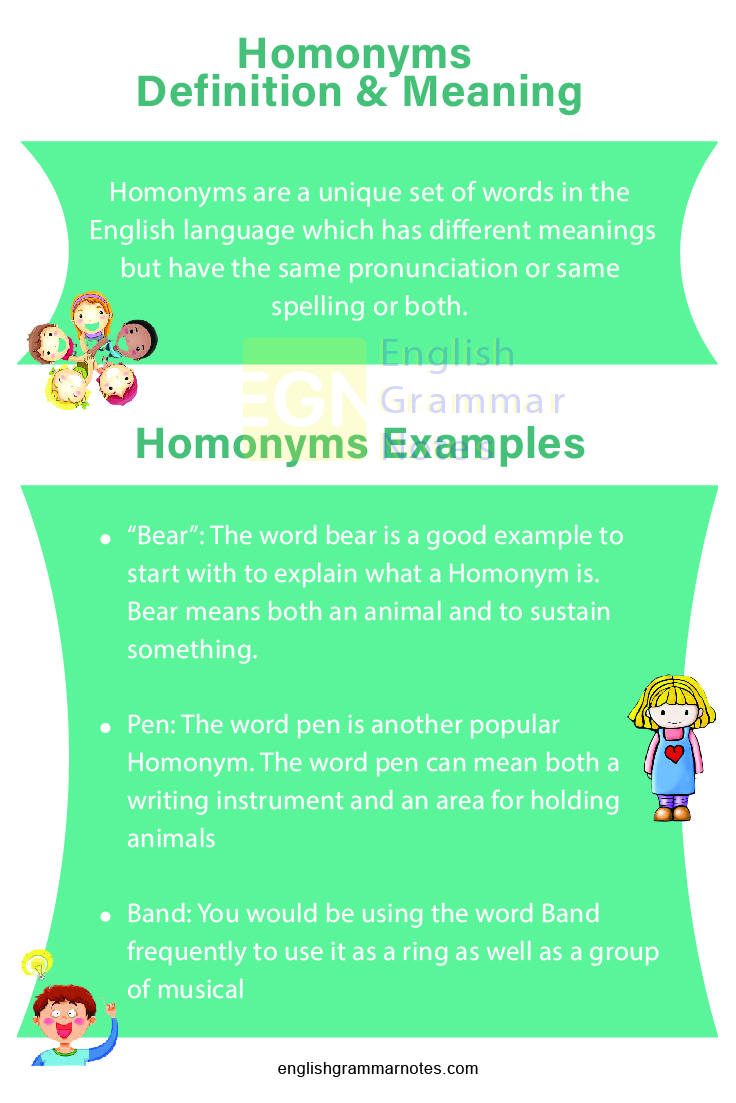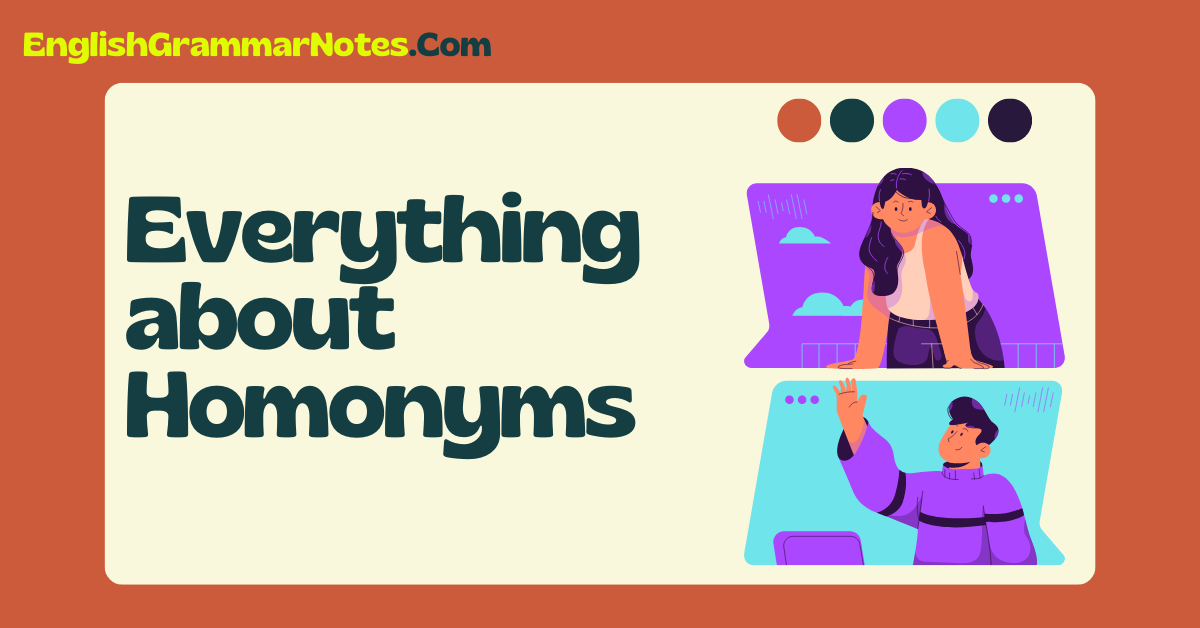English is a funny language and no one can contest it. There are plenty of idiosyncrasies for this language that makes it not just funny but highly confusing to people who are just learning the language anew. However, since English is a highly popular and undoubtedly, the most widely used language in the world, people just ignore the downsides associated with this language and learn it anyway. In this particular article, we are going to discuss one such funny side common words of the English language.
This particular article on what are homonyms and their examples can be used by students of English for their assignments, homework, project work, etc, in schools and colleges.
- Homonyms Definition & Meaning
- Homonyms Examples
- Where are Homonyms used?
- What are the 20 Examples of Homonyms? | Homonyms Examples with Sentences
- What is the difference between Homonyms, Homophones, and Homographs?
- What is the objective of Homonyms?
- What is the importance of learning homonyms?
- Can homonyms have more than 2 meanings?
- Other than homonyms, what are the different sets of words in the English language that are as confusing?
Homonyms Definition & Meaning
Homonyms are a unique set of words in the English language which has different meanings but have the same pronunciation or same spelling or both. There are plenty of such examples in the English language and we are going to discuss the same in this particular article on what are homonyms.
Homonyms can be very confusing, even for an English pandit. They can be divided into three different classes or categories, which are:
- Homonyms can be two or more words with the same pronunciation and spelling with different meanings
- Homonyms can be two or more two words that have identical pronunciation but different spellings as well as different meanings for each of the words
- Or, In the last case, where Homonyms can be a set of words that might have the same spelling but the meaning and pronunciations are completely different.
Now that we have taxed your mind enough and proved our point on how funny and quirky the language of English is, let us dig a little deeper into the culprits of the English language, the homonyms, and understand its importance and usage through examples.
Homonyms Examples
- “Bear”: The word bear is a good example to start with to explain what a Homonym is. Bear means both an animal and to sustain something. You ask why, well as we already mentioned, homonyms are an exception and it’s hard to find logic on why these words are like these
- Pen: The word pen is another popular Homonym. The word pen can mean both a writing instrument and an area for holding animals
- Address: The word address is a Homonym that has the same spelling and pronunciation but different meanings. One meaning of the word address means location and the other means to speak to people
- Band: You would be using the word Band frequently to use it as a ring as well as a group of musical
- Bat: Bat can refer to both a nocturnal flying mammal as well as an instrument to hit a ball, mainly used in the same sports.
As you can see above, the common thing in almost all the words mentioned above is the fact that they have more than one meaning but have the same spelling and pronunciation. We have provided more such examples in the subsequent sections of this article on What are Homonyms and their examples.

Where are Homonyms used?
While homonyms can sound like simple words with more than one meaning, these words can have a far-reaching impact on one’s life, if one can understand them well and use them appropriately. Below we have tried to analyze certain situations where Homonyms are used and are of importance:
Legal Agreements: One needs to keep a tab of Homonyms in anything that has a signatory paper. Homonyms should be identified and defined appropriately in legal agreements so that they shouldn’t be used against oneself during a legal conflict. Lawyers and people who draft legal agreements will always be careful with the usage of words in legal agreements.
The different legal agreements where Homonyms should be used and defined appropriately are Housing Rent Agreement, Employee agreement, Non-Disclosure Agreement, Confidentiality Agreement, Ancestral property agreement, etc.
Corporate Communications: Marketing and communication have become the key for any business in today’s competitive world. And communication, both internal and external, in a business environment, is very important and needs to be carefully analyzed. Usage of Synonyms, Homonyms, Homographs, and other such words properly at the right place and at the right time will help one to make a mark in the corporate communication and this type of good command over the language of English (both written and spoken) can be a beneficial factor in employee performance evaluation
Entrance Examination: People who have attempted to give Management entrance examinations such as CAT, GMAT, TOEFL, etc, will understand the importance of the nuances involved in the language of English. To crack an examination that judges your understanding of the English language, it becomes imperative and extremely necessary for one to learn the different Homonyms and various other unique sets of words in the language
Conversations: Conversations and talking to people are the key to socializing and building a network and one needs to learn the art of talking. And since English is the global language and the one that is most widely used, especially in the business and international diplomacy, a good understanding of Homonyms and their usages will help a person to have a better conversation in English and may try to make an impression in front of another person.
Also, Read:
What are the 20 Examples of Homonyms? | Homonyms Examples with Sentences
Below we have given 20 sentences using Homonyms that students can use for their homework, assignments, project works, etc.
- There are a lot of bats on that tree.
The bat used by him to win was of good quality. - He had to bear all the costs involved in the trip.
The bear was caught napping on the tree. - I can run fast.
The can was full of worms. - I gave my best friend a friendship band on friendship day.
The band that performed last night was really good. - He proposed to his girlfriend with a gold ring.
I had to ring him up 10 times before visiting him. - That was a weird kind of cheesecake.
She was kind to the stray dog. - He is a very bright student.
The bulb was as bright as the Sun. - The fly was flying around the food the whole time.
I had to fly for 4 hours in the flight to meet my parents. - She loves when someone gives her a rose.
Everyone rose from their seats when the Queen walked in. - The match between India and Pakistan was a close one.
Those two colors do not match together. - The current of the tide was very high.
She is always up to date with her current affairs. - The bow tie he wore was asymmetric.
Everyone had to bow to the queen when she walked in. - The wind was strong enough to blow the car away.
The snake had to wind around the tree to escape from the rains. - The records maintained in the court of law were used to win the case.
I had to record the whole dance video before the camera battery ran out. - They had to row the boat for more than five miles.
They sowed the seeds in a neat row and spaced them apart well. - I had to tear the entire house down because of the yeast in the house.
Tears fell down her eyes as soon as she saw him after 4 long years. - I had to close down the shop immediately after the curfew.
They both were too close to be just friends. - Well, that did not go his way.
The boy fell in the well while playing catch. - One should always drive on the right side of the road.
He was right about driving on the right side of the road though. - I had to sow more than 100 seeds of pumpkin in my backyard.
The sow near my house gave birth to 5 baby pigs last night.
What is the difference between Homonyms, Homophones, and Homographs?
In many cases, Homonyms, Homophones, and Homographs are used in the English language interchangeably while they shouldn’t be used interchangeably. Words that have the same pronunciation and spelling but different meanings are called Homonyms. Words that have identical pronunciation but different spellings and meanings are called homographs while words that have different pronunciations and meanings but are spelled alike can be called Homophones.
You can check our other articles on How to Improve Vocabulary Words and explore various kinds of words to use in your regular conversations.
FAQs on Homonyms
1. What is the objective of Homonyms?
Homonyms can be a perfect opportunity for people who are learning English to understand the different nuances involved in the English language related to pronunciation, spelling, and meaning. Homonyms, while being confusing to native speakers, can be challenging to non-native speakers and that is the beauty of the language of English
2. What is the importance of learning homonyms?
The meaning, usage, and different types of homonyms need to be understood by people who speak and write in the English language for them because these words can be confusing and can easily be misinterpreted and misinformed in careful and sensitive situations such as business meetings, corporate communications, legal agreements, government communications, etc.
3. Can homonyms have more than 2 meanings?
Homonyms can have more than 2 meanings or just 2 meanings and there is no set definition for the number of meanings that homonyms can have.
4. Other than homonyms, what are the different sets of words in the English language that are as confusing?
Other than homonyms, there are other set of words in the English language such as Homophones, Homographs, Synonyms, etc that can be challenging and confusing for beginners and non-native speakers of the English language
